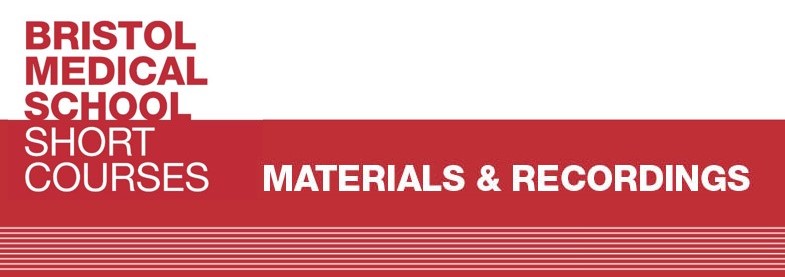Further Survival Analysis
Survival analysis, also known as time-to-event analysis, uses duration data to estimate rates of events and associations of time with possible explanatory variables. University of Bristol academics (including those tutoring on this course) have wide-ranging experience in applying these methods within health research.
| Dates | 7 - 8 July 2025 |
|---|---|
| Fee | £220 |
| Format | Online |
| Audience | Open to all applicants (prerequisites apply) |
 Course profile
Course profile
This course aims to:
- explain and implement parametric survival models;
- use flexible parametric survival models; and
- introduce the concept of competing risks in modelling time-to-event data.
Please click on the sections below for more information.
Structure
This course will be delivered online over 2 mornings, with 3 lectures and 3 practical sessions over approximately 7.5 hours (9.15am - 1pm each day).
Intended Learning Objectives
By the end of the course participants should be able to:
- analyse data using Poisson, Cox and parametric (e.g. Weibull) regression models;
- describe the links between these approaches;
- use flexible parametric survival analysis to improve model fit to the data; and
- analyse survival data with competing outcomes.
Target audience
This course is intended for medical statisticians. Applicants should be competent users of Stata (although code in R will also be made available) and should be familiar with basic survival analysis e.g. Cox models, equivalent to the level taught in the Introduction to Rates and Survival Analysis short course.
Outline
This course will cover:
- parametric survival models;
- flexible parametric survival models; and
- competing risks in survival analysis.
Teaching staff
This course is taught by Dr Suzanne Ingle and Dr Adam Trickey. Both have expertise in Survival Analysis through their work in applying the methods in HIV observational cohort studies for many years.
Prerequisites
To make sure the course is suitable for you and you will benefit from attending, please ensure you meet the following prerequisites before booking:
| Knowledge | Participants should be familiar with the basics of survival analysis, to at least the level attained from the Introduction to Rates and Survival Analysis short course. |
|---|---|
| Software |
Participants should be familiar with using Stata statistical software and implementing survival analyses within Stata (code for practicals will also be made available in R). You must have Stata* or R installed in advance of the course. *Internal University of Bristol participants are given access to Stata. Go to Stata Installation Instructions (internal only) for help setting it up before the start of the course. External participants are responsible for providing their own access to Stata, however if you are an employee of a university or another institution you may be able to get a short term free Evaluate license. If you are a student, Stata offer a short term free Student licence (one week). |
| Recommendation | We recommend that participants have access to two screens to facilitate participation. |
Bookings
Before booking this course, please make sure you read the information provided above about the target audience and prerequisites. It is important that you have access to the relevant IT resources needed for the course and meet the knowledge prerequisites to ensure you can get the most from the course.
Bookings are taken via our online booking system, for which you must register an account. To check if you are eligible for free or discounted courses please see our fees and voucher packs page. All bookings are subject to our terms & conditions, which can be read in full here.
For help and support with booking a course refer to our booking information page, FAQs or feel free to contact us directly. For available payment options please see: How to pay your short course fees.
Course materials
Participants are granted access to our virtual learning platform (Blackboard) 1 to 2 weeks in advance of the course. This allows time for any pre-course work to be completed and to familiarise with the platform.
To gain the most from the course, we recommend that you attend in full and participate in all interactive components. We endeavour to record all live lecture sessions and upload these to the online learning environment within 24 hours. This allows course participants to review these sessions at leisure and revisit them multiple times. Please note that we do not record breakout sessions.
All course participants retain access to the online learning materials and recordings for 3 months after the course.
University of Bristol staff and postgraduate students who do not wish to attend the full course may instead register for access to the 'Materials & Recordings' version of this course: Further information and bookings.
Testimonials
92% of attendees recommend this course*.
*Attendee feedback from 2024.
Here is a sample of feedback from the last run of the course:
"Everything was very clearly explained, with good building on and development of models." - Course feedback, July 2024
"The tutorial and question padlet really helps." - Course feedback, July 2024
"Practicals and lectures paired really well." - Course feedback, July 2024
"The course was very good and I feel like I have learned a lot." - Course feedback, July 2024
"The lecturers were knowledgeable, friendly and engaging and for the most part were able to explain complex concepts in an accessible manner." - Course feedback, July 2024
"The lecturers are very knowledgeable." - Course feedback, July 2024
"The staff running the course were very engaging and very quick to answer any questions that were raised." - Course feedback, July 2024
 Book this short course:
Book this short course:
Standard fee option
50% discount voucher*
100% discount voucher*
*Find out if you are eligible for a voucher pack for free or discounted courses.
Note: Bookings close 2 weeks before the course start date.
The lecturers were knowledgeable, friendly and engaging and for the most part were able to explain complex concepts in an accessible manner.
 Can't attend live? Just want a refresher?
Can't attend live? Just want a refresher?
For University of Bristol staff and postgraduate researchers: access to course materials and lecture recordings for self-paced learning. Find out more.
 You may also like:
You may also like:
 Questions?
Questions?
Explore our comprehensive FAQ pages or contact us for help and support.
Find out more about: